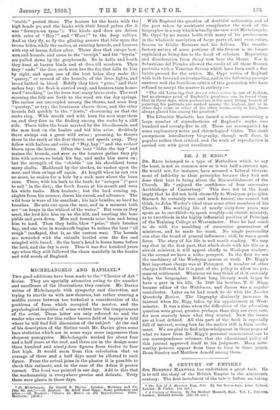A CENTURY OF EMPIRE.t
SIR HERBERT MAXWELL, has undertaken a great task. He is to tell the story of the British Empire in the nineteenth century. The first instalment of the tale is before us, taking • The Info of J. Harrison Rigg, D.D. By his Son-in-Law, John Telford. London: R. Culley. [5s. net.] t A Century of Empire. By Sir Herbert Maxwell, Bart. Vol. I., 1E014832. London : Edward Arnold. [12s. 6d. net.] in something less than a third of the period. The Act of Union between Great Britain and Ireland, passed in 1801, is the starting-point ; the stage at which he halts is the passing of the Reform Bill in 1832. Practically he limits himself to domestic and foreign politics, together with naval and military history. Eight pages, it is true, are devoted to British rule in India, though these do not take us as far as the end of the first decade of the century. Of other parts of the Empire no mention is made. Canada occurs in the narrative of the war with the United States in 1812-14; the Colonies do not appear. We do not complain, but only wonder how room will be found for their affairs when mention, indeed something more than mention, becomes imperative. Of the condition of the people, of commerce and agriculture, we hear very little; of art and literature, we may say, nothing. We repeat that we do not complain, but wonder. How is this title, A Century of Empire, to be justified ? The subjects to which Sir Herbert Maxwell has confined himself in these pages will make no less urgent demands upon his space, and there will be all thetas additional claimants. Meanwhile, however, we may be thankful for what our author has given us. Some fifty or sixty pages are allotted, for instance—and they are all that we could desire—to the Peninsular War. The military operations are briefly but lucidly described, and we have the story of what was going on at home in reference to the war. The latter subject is not so pleasant to read about, but it is of at least equal importance. The party system never showed itself to greater disadvantage. The Opposition did its utmost to hamper the action of the Ministry. Their policy was unfairly judged ; an historian so able as Napier "never could bring himself," as our author puts it, "to say
gocd word for a Tory Government." The Generals in the field were treated with equal unfairness. Lord Hutchinson, a soldier of some diStinction, who was in the councils of the Prince Regent, said " that Wellington ought to be hanged." All this seems monstrous to us now ; but the malignity of party has shown itself with scarcely less virulence within the last few years. It is true that there were the grossest provoca tions to bring about this violence. It was hard indeed to do justice to a Government that used its mechanical majority to condone the misconduct of the Duke of York in the Clarke affair. Sir Herbert Maxwell expresses himself frankly as to this matter. It is his habit, in fact, to hold the scales with an even hand. His readers may rely on finding what he has to tell them told fairly and told well.







































 Previous page
Previous page